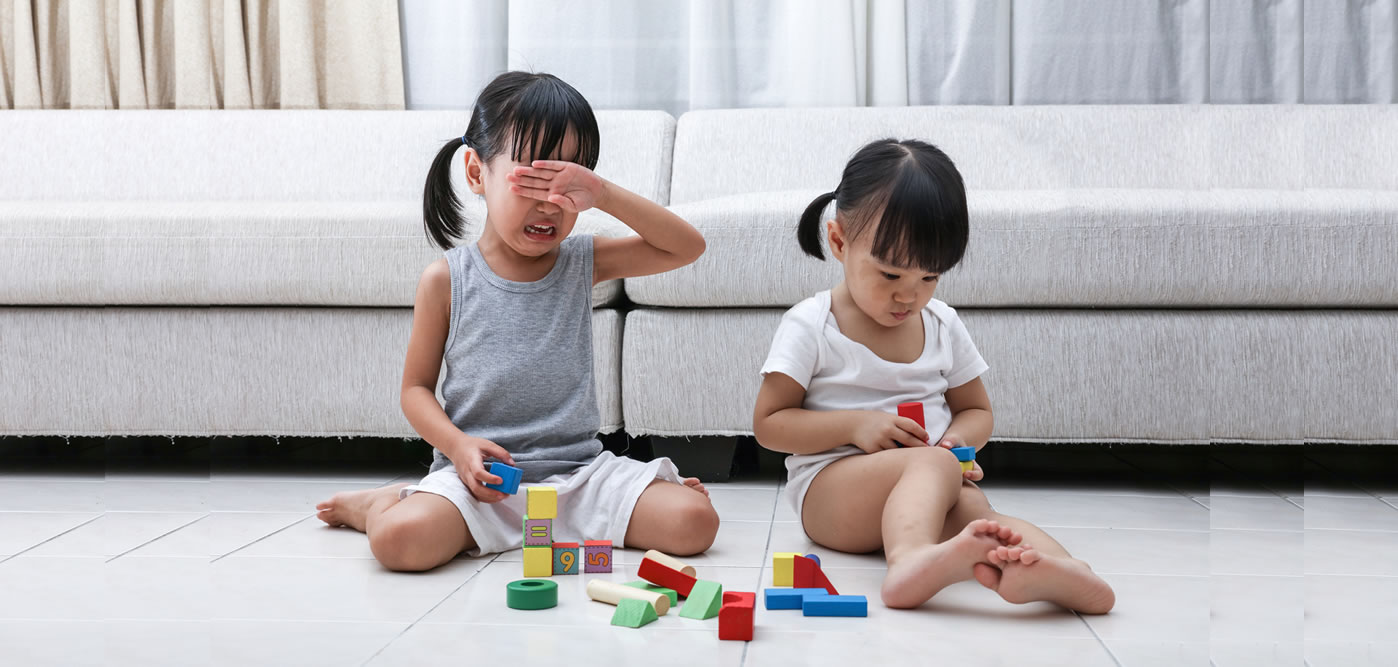How sibling conflict can actually benefit children
Published on Wednesday, 11 November 2020
Last updated on Sunday, 08 November 2020

Parenting two or more children brings its share of rewards and challenges, and when it comes to sibling conflict, it’s very common for children to have disagreements and for parents to be called upon to ‘referee’ alternate versions of events or more fairly distribute time, attention and things.
The good news is that sibling disagreements can have positives for children’s development, and there are ways for parents to reduce, and better manage, disagreements.
Here we look at expert advice in the area and share some practical tips.
What are the benefits of sibling conflict?
Although sibling disagreements can get heated (or just plain annoying), research suggests that these interactions are unique opportunities for social-cognitive development and can build children’s life skills.
An international literature review has found that conflict can help siblings, ‘Develop skills in perspective taking, emotion understanding, negotiation, persuasion, and problem solving’ – with broad effect.
The authors add that, ‘These competencies extend beyond the sibling relationship and are linked to later social competence, emotion understanding and peer relationships.’
How can parents manage sibling conflict?
Although a degree of sibling conflict can help children develop life skills, this doesn’t mean sibling fights should be a ‘free for all’.
It’s important for parents to understand why disagreements are happening, how to reduce conflict between brothers and sisters (or same-sex siblings), and when to step in.
What is a common cause of sibling conflict and how can this root cause be remedied?
Senior psychology lecturer, Dr Rachael Sharman, says that competition is the, ‘Likely precipitating factor in sibling conflict’ and this often involves children competing with each other for parental resources, such as time with Mum, attention from Dad or material things.
To reduce the possibility of competition causing conflict, Dr Sharman advises parents to evenly spread resources between siblings. She says, ‘Ensuring time, energy and material wealth is shared equally amongst your children will assist in reducing conflict.’
It’s important that parents never play favourites, and instead, that they teach children, ‘About the value of sharing, cooperation and give and take.’
When should parents intervene in a sibling conflict?
The type of sibling disagreement will influence how quickly you step in, and whether you intervene at all.
Dr Sharman says there are times when intervention should be delayed to allow children to learn life skills through conflict. In her view, ‘An anti-intervention or at least delayed intervention approach works well if the conflict is developmentally expected, for example fighting over access to a toy, and there isn't a clear power imbalance between the siblings and/or the argument isn't deteriorating to violence.’
It is important to intervene swiftly in the case of sibling bullying, though.
Sibling bullying is, ‘A repeated pattern of abuse that appears motivated by one sibling’s desire to maintain power over the other’ and this kind of conflict can be detrimental to the victim, now and later.
Research has shown that sibling bullying increases a victim’s risk of peer bullying, and increases their risk of emotional problems in adulthood, such as depression and self-harm; and sibling bullying can take different forms. It might be:
- Physical, e.g. a sibling hits or kicks their sibling on repeated occasions
- Psychological, e.g. a sibling says hurtful or mean things to their brother/sister
- Social, e.g. a sibling tells lies or spreads rumours, or
- Property-based, e.g. a sibling steals or damages their sibling’s things.
What are 8 top tips for managing sibling conflict?
Parents need to make case-by-case decisions around sibling conflict, but as a guide, the experts suggest that mums and dads can do certain things to manage disagreements between brothers, sisters and same-sex siblings.
Parents are encouraged to:
- Set the ground rules for how siblings should speak and behave around one another.
- Spread time, attention and material resources equally between siblings, explaining that sometimes a child’s age or experiences will mean that one child may get something that the other child doesn’t.
- Organise family activities to provide parental attention and help establish how siblings should interact.
- Role model positive ways to manage conflicts.
- Model empathy to show children how words and actions impact others.
- Recognise that some triggers, like fatigue or hunger, can play a big part in sibling conflicts.
- Teach children to identify their emotions and how to manage them (if a conflict is escalating, siblings might need to be separated until their emotions have settled down, then brought back together to discuss the disagreement).
- Recognise that siblings sometimes need time apart. Individual play dates and one-on-one time with Mum/Dad are two good ways to give warring siblings some space.
All in all, sibling conflict isn’t always as bad as it sounds.
Children can learn important life skills as they tussle over toys or compete for a parent’s attention, and it’s the job of parents to monitor the situation, intervene if necessary and support positive interactions between siblings. Good luck!
Reference
Related Articles

Your child's mental health
Most parents can spot a gunky eye or a grazed knee from a mile off, but when it comes to a youngster's mental health, it seems that many mums and dads are in the dark.

How to deal with pester power
Tantrum management and turning a blind eye to pester power, learn how.

How to deal with techno-tantrums
Although an age-appropriate amount of screen time can be beneficial for children’s learning, too much time on a digital device does your child no favours.
